Dubai’s online fashion industry is booming, the UAE’s eCommerce market is projected to reach USD 17 billion by 2025, with fashion being one of the top three performing sectors.
According to Statista, online fashion sales in the UAE crossed $1.5 billion in 2023, and the numbers are only climbing.
With a tech-savvy population, a 99% internet penetration rate, and a strong appetite for global and homegrown fashion brands, Dubai offers the perfect digital ecosystem for launching your own online clothing business with the help of ecommerce development solutions.
But here’s the real question:
How do you turn a fashion idea into a thriving online brand in one of the world’s most competitive and opportunity-rich markets?
If you’re an aspiring fashion entrepreneur or a retailer looking to tap into the UAE’s digital-first audience, this step-by-step guide will walk you through everything.
From obtaining an eCommerce license in Dubai to setting up your online store, sourcing products, managing logistics, and scaling your brand in the Middle East’s fashion capital.
Let’s dive into how to start an online clothing business in Dubai, legally, profitably, and with long-term growth in mind.
1) Define Your Niche in the Dubai Fashion Market
Before you even register your business or start designing your logo, the most crucial step is identifying what kind of clothing you want to sell, and who you want to sell it to. In a diverse, multicultural market like Dubai, a well-defined niche can set you apart in an increasingly saturated online fashion space.
From modest fashion and streetwear to luxury couture, activewear, sustainable clothing, and kidswear, there’s room for multiple styles, but each demands a distinct brand voice and marketing strategy.
Research What Sells Best Online in Dubai
Understanding customer preferences is key.
According to local market insights, modest wear, designer abayas, premium activewear, and contemporary fusion fashion are among the best-selling clothing segments online in the UAE.
Global trends also show growing demand for eco-conscious fashion and size-inclusive collections, especially among younger, urban shoppers.
You can validate your niche ideas by:
- Exploring trending categories on platforms like Namshi, 6th Street, Zara and Amazon.ae
- Using Google Trends (UAE) to track interest in search terms like “sustainable clothing Dubai” or “modest fashion online”
- Analyzing competitors and identifying underserved customer segments
- Checking social media hashtags (like #DubaiFashion or #ModestWearUAE) to see what’s trending
Also read: How to create an ecommerce fashion app like Zara!
Questions to Consider Before Finalizing Your Niche:
- What type of clothing sells best in Dubai online? (Modest wear, casual luxury, and activewear dominate digital fashion sales.)
- Is there a gap in the market I can fill with my unique product line?
- Am I solving a problem or meeting a lifestyle preference for my target audience?
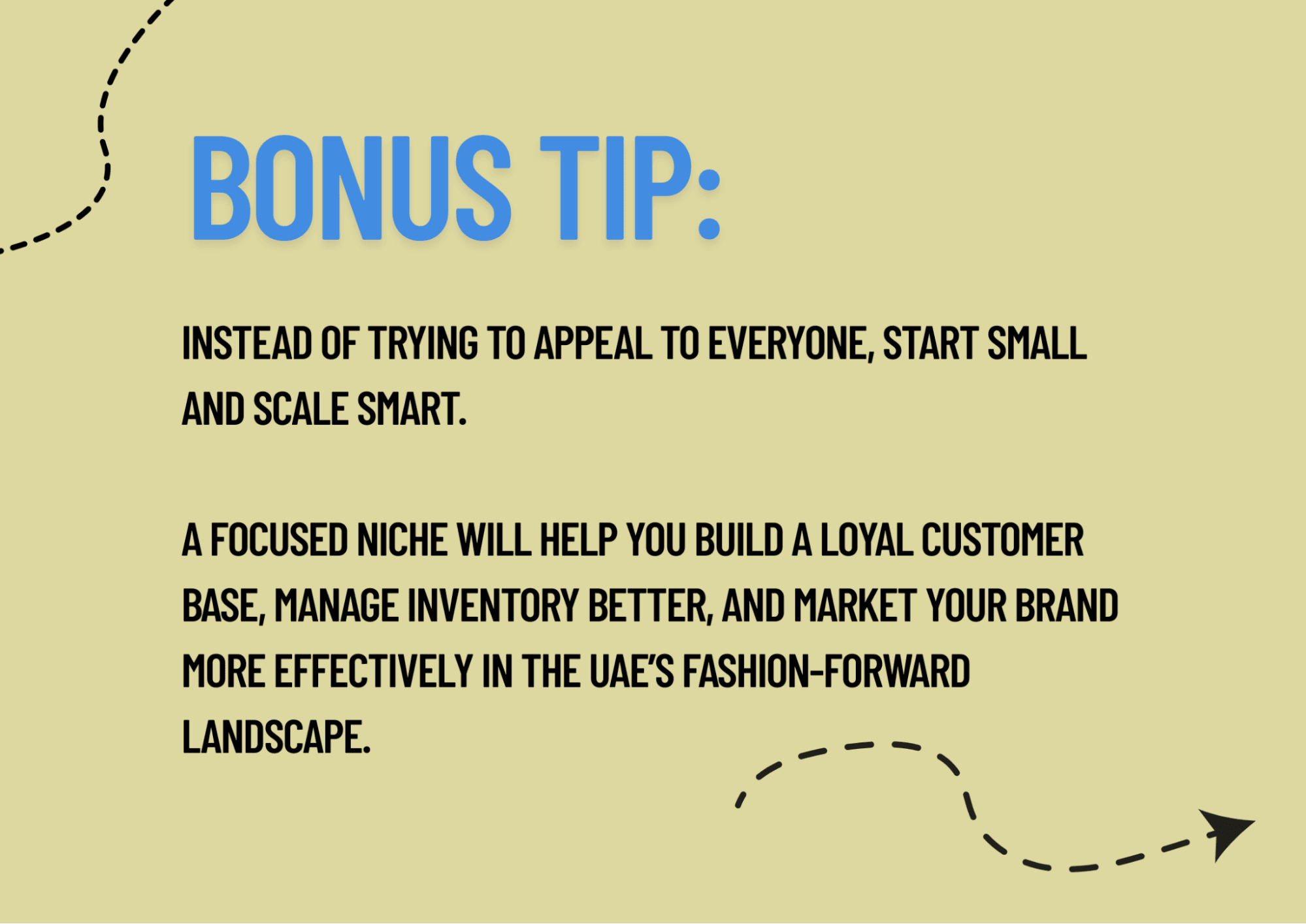
2) Legal Requirements & Business Licensing in Dubai
Many of you might ask “Do I need a license to sell clothes online in Dubai?” the answer is a big yes! Whether you’re selling via Instagram, a personal website, or a marketplace, a valid eCommerce license is mandatory to legally operate in Dubai and across the UAE.
Before launching your online clothing store in Dubai, getting the legal setup right is non-negotiable.
The UAE government encourages digital entrepreneurship, but operating an eCommerce business without the proper license can lead to penalties or even a ban.
Let’s simplify the legal roadmap for you.
Mainland vs. Free Zone: Where Should You Set Up?
In Dubai, you can either register your online clothing business under the mainland (regulated by the Department of Economic Development, or DED) or in a free zone (like Dubai CommerCity, IFZA, or SHAMS). Each has its advantages:
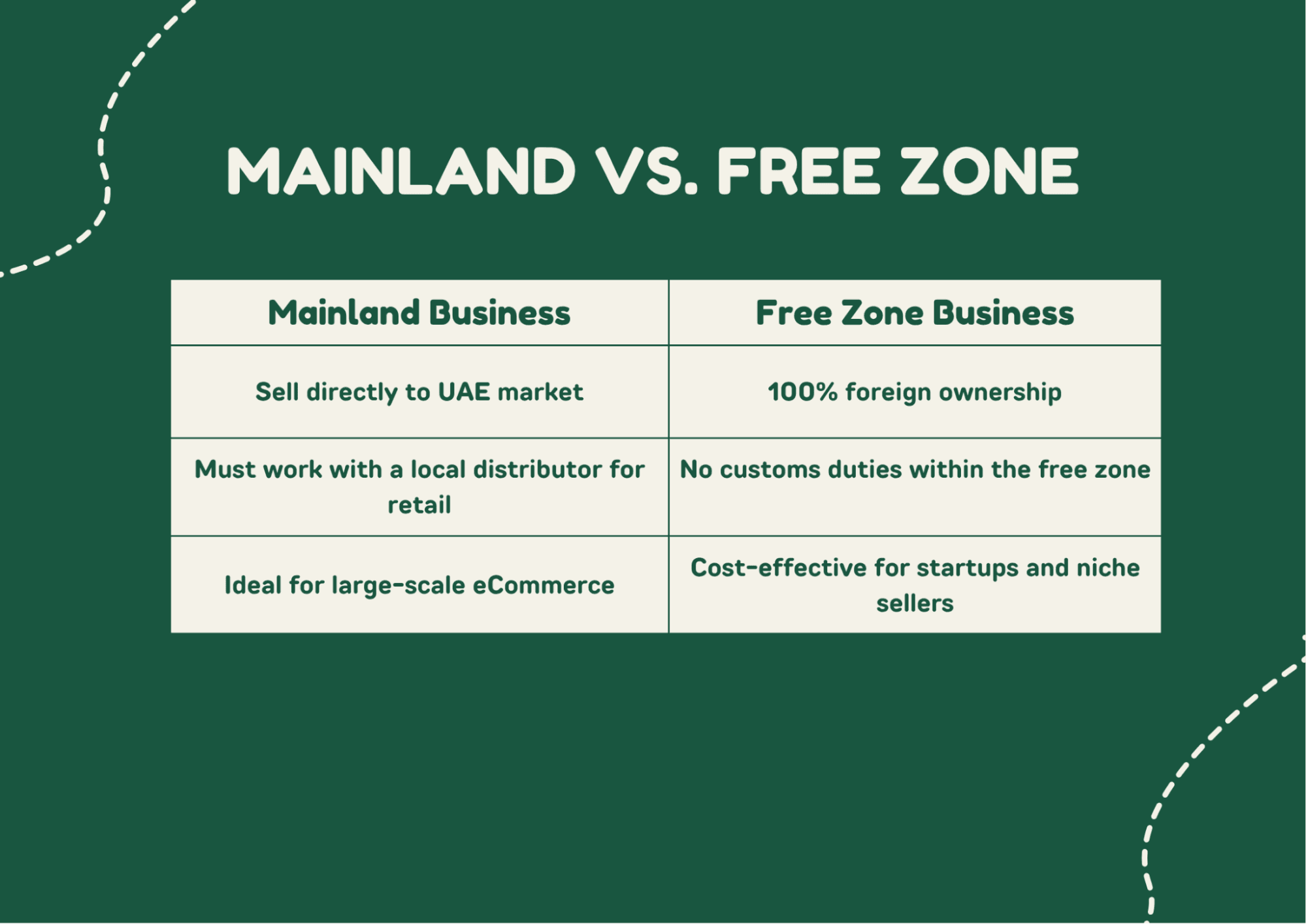
If your main goal is to sell clothes online within Dubai or across the UAE, both options work well. However, free zones offer more flexibility and affordability for first-time entrepreneurs.
What License Do You Need to Sell Clothes Online in Dubai?
To legally operate, you’ll need an eCommerce license, this allows you to sell goods via your website or third-party platforms.
- DED eTrader License: Suitable for UAE residents selling online via Instagram or small websites. Limited to UAE nationals or GCC expats.
- Professional License via Free Zones: Perfect for international sellers or expats. Costs are competitive, and the process is fast and digital.
Average License Cost:
AED 5,500 – AED 15,000 annually, depending on the jurisdiction and scope of business.
Also, know the average cost of building an app in Dubai in 2025!
Additional Legal Steps You Shouldn’t Miss:
- Register Your Brand Name: Make it unique and compliant with UAE’s naming conventions.
- Get a Tax Registration Number (TRN): If your turnover exceeds AED 375,000 annually, VAT registration is mandatory.
- Import Code (if sourcing internationally): Required for customs clearance in Dubai.
- Compliance with UAE’s eCommerce laws: Your platform must include terms and conditions, a privacy policy, return/refund policy, and secure payment gateways.
3) Build a Strong Online Presence for Your Clothing Brand
Once your business is legally registered, it’s time to establish your digital storefront, this is where the success of your online clothing business in Dubai truly begins.
In a visually driven market like fashion, your online presence isn’t just a platform, it’s your brand identity.
Choose the Right eCommerce Platform
Whether you’re selling casual wear or curated designer pieces, choosing the right platform sets the tone for your brand experience. You can:
- Build your own website using platforms like Shopify, WooCommerce (WordPress), or Magento
- Sell on popular online marketplaces like Amazon.ae, Noon, Namshi, or Sivvi
Create a Visual Brand That Speaks Luxury & Trust
Dubai consumers expect polished visuals, fast navigation, and trust signals. Keep these in mind:
- Use high-quality product photography (consider flat lays, model shots, 360° views)
- Build a mobile-first UI/UX design for your site
- Ensure fast loading speeds (especially for high-res fashion images)
- Integrate live chat, customer reviews, and return/refund policies for transparency
Integrate Secure, Local-Friendly Payment Gateways
Consumers in the UAE prefer cashless and convenient options. Your platform should support:
- Tabby or Tamara (Buy Now Pay Later)
- PayTabs, Telr, Stripe, or PayFort for card payments
- Cash on Delivery (COD), still preferred in certain segments
Focus on Local SEO & Multilingual Content
To appear in Dubai-specific Google searches, optimize your website with:
- Keywords like “online clothing store Dubai,” “buy dresses online UAE,” or “modest fashion Dubai”
- Arabic translations for your core pages and product listings
- Location-based metadata, Google My Business profile, and schema markup for better local ranking
So now if someone asks how can I sell clothes online in Dubai successfully? You know how to help them by your own experience!
Read more on Megento, Shopify, WooCommerce, which is the best ecommerce platform?
4) Source, Stock, and Ship: Managing Inventory & Logistics
Now that your digital storefront is up and running, it’s time to handle what makes or breaks an online clothing business:
- Product sourcing
- inventory management
- last-mile delivery.
In Dubai’s competitive eCommerce scene, fast and reliable shipping can be a major differentiator.
How do I manage inventory and shipping for my online clothing store in Dubai? Let’s have a look:
Choose the Right Product Sourcing Model
Your sourcing strategy depends on your budget, brand vision, and inventory risk tolerance:
Private Label Manufacturing
- Ideal for creating a unique fashion line under your own brand
- Requires upfront investment but offers higher margins
- Work with manufacturers in Dubai, India, Turkey, or China
Dropshipping
- No inventory required; suppliers ship directly to customers
- Low-risk model to test designs or enter niche segments
- Partner with local suppliers or platforms like Spocket or Modalyst that support UAE delivery
Wholesale Buying
- Purchase ready-made clothes in bulk from trusted suppliers
- Store products locally for faster fulfillment
- Suitable for multi-brand fashion stores or boutiques
Where to Store Inventory in Dubai?
- Use Third-Party Logistics (3PL) providers like Shipa, Aramex, or Quiqup for warehousing and fulfillment.
- Store inventory in a Free Zone warehouse (if you’re registered there) to avoid import duties
- For small businesses, self-storage units or home-based inventory can work during the initial phase
Shipping & Delivery Options
Consumers in Dubai expect same-day or next-day delivery, especially for fashion. Here’s how to meet that:
- Partner with local couriers like Aramex, Fetchr, or Quiqup for same-day/next-day options
- Offer multiple delivery modes (standard, express, click-and-collect if possible)
Provide real-time tracking and free shipping thresholds to boost conversion
Streamline Returns & Refunds
Fashion often comes with high return rates. Build trust with a transparent and flexible return policy:
- Offer free or low-cost returns within 7–14 days
- Include clear sizing charts and product videos to reduce returns
- Automate the return process on your website using tools like Returnly or Loop
5) Marketing Your Online Clothing Business in Dubai
Once your online store is live and logistics are in place, it’s time to drive traffic and turn visitors into loyal customers.
In Dubai’s digital-first market, standing out takes more than just good product photography, it requires data-driven, hyper-local marketing tailored to a style-savvy audience.
Leverage Social Media, Where Fashion Lives
In the UAE, platforms like Instagram, TikTok, and Snapchat dominate the fashion space. Create content that blends style, culture, and aspiration to attract your ideal buyers.
- Post high-quality lookbooks, influencer try-ons, and behind-the-scenes shots
- Use Arabic and English captions to broaden your reach
- Collaborate with local influencers and micro-celebrities for paid promotions
- Tap into hashtags like #DubaiStyle, #ModestFashion, #ShopUAE
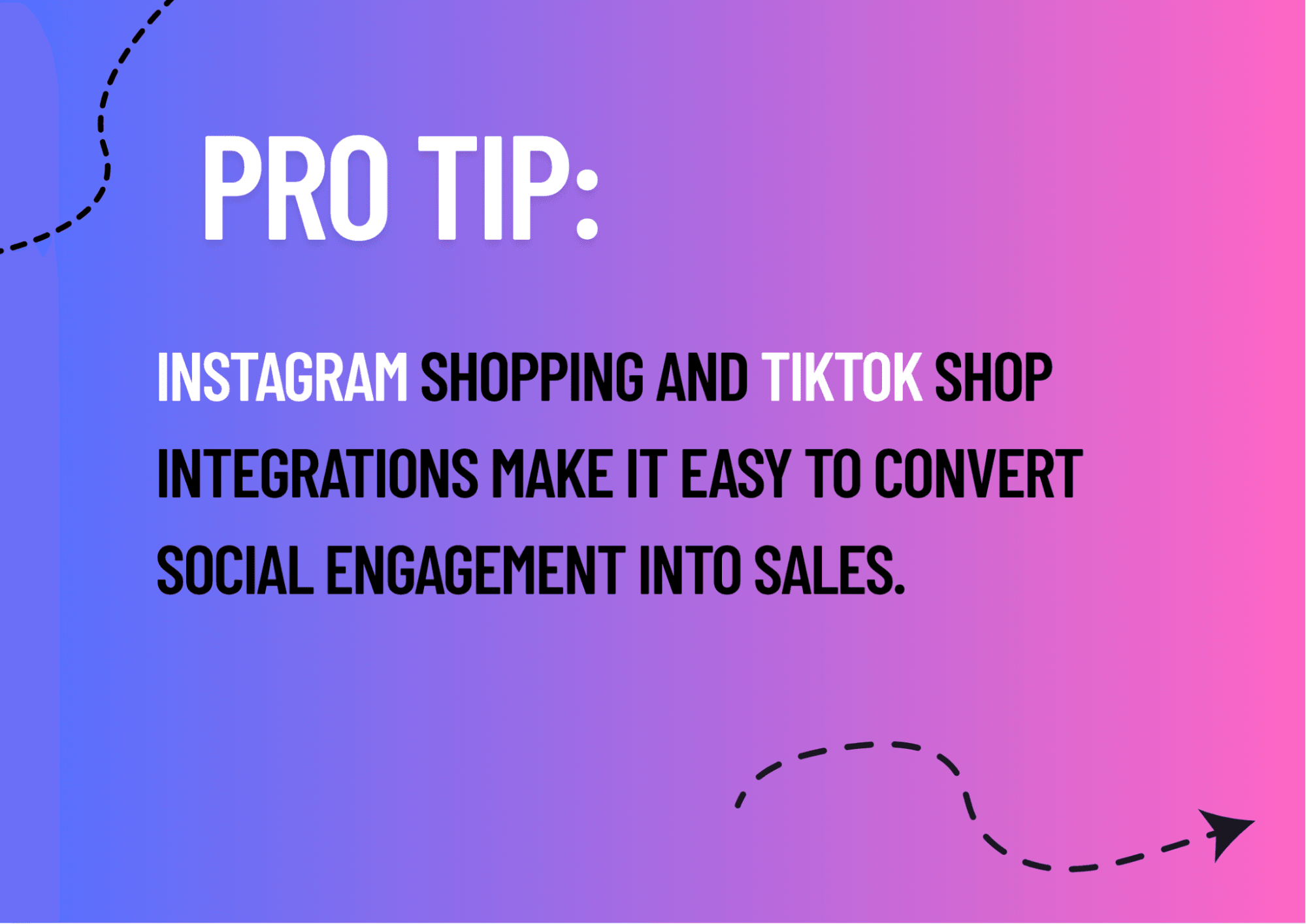
Run Geo-Targeted Ads on Google and Meta
Paid ads help you reach customers fast. Set up:
- Google Search Ads targeting keywords like “buy abaya online UAE” or “online clothing store Dubai”
- Facebook & Instagram Ads targeting users in specific Dubai locations, interests (fashion, lifestyle), and languages
- Remarketing campaigns to convert visitors who didn’t buy on the first visit
Offer Arabic-Friendly User Experience
With Arabic-speaking locals and expats making a big part of the UAE’s population, localization is more than a bonus, it’s a trust factor.
- Include Arabic language toggle on your website
- Translate your ads and key product pages
- Ensure your fonts, layout, and design are culturally intuitive
Email & SMS Marketing for Retention
Don’t just sell, build a community. Encourage newsletter signups and offer exclusive first-access or discounts via:
- Email drip campaigns for abandoned carts, new arrivals, seasonal drops
- SMS campaigns for flash sales and last-minute delivery offers (hugely effective in the UAE)
Offer Loyalty Programs & Referral Discounts
Reward your customers for staying loyal. A well-structured loyalty program or referral discount encourages repeat purchases and word-of-mouth buzz.
What should I avoid when starting an online clothing business in Dubai?
The fashion eCommerce market in Dubai is vibrant but highly competitive. Avoiding a few common missteps can save you time, money, and reputation. Here are the top pitfalls new fashion entrepreneurs often make, and how you can sidestep them:
1. Ignoring Cultural Sensitivities
Dubai is a cosmopolitan city, but it deeply respects its traditions. Failing to account for modesty norms, religious holidays, or regional preferences can alienate your audience.
Avoid this by:
- Offering modest fashion lines (like abayas, kaftans, or hijab-friendly pieces)
- Timing your launches around Eid, Ramadan, and UAE National Day
- Using culturally appropriate visuals and messaging in your marketing
2. Overcomplicating the Website Experience
Fashion is visual, but your website also needs to be fast, intuitive, and mobile-optimized. Many new brands overload their sites with too many popups, slow-loading images, or poor navigation.
Avoid this by:
- Prioritizing clean design with fast checkout
- Compressing images without sacrificing quality
- Running regular mobile performance tests (Google’s PageSpeed Insights helps)
3. Neglecting SEO & Content Strategy
If your products don’t show up on Google, they might as well not exist. Too many businesses rely only on Instagram to grow.
Avoid this by:
- Creating SEO-optimized product titles and descriptions
- Writing fashion guides, trend blogs, or “how to style” posts targeting UAE audiences
- Using Google Keyword Planner or Ubersuggest for local keyword research
4. Poor Inventory Planning
Ordering too much or too little stock, especially for trending items, can hurt cash flow or reputation.
Avoid this by:
- Starting lean with limited SKUs
- Tracking real-time sales and setting reorder alerts
- Testing small batches before scaling up
5. Not Providing Flexible Payment & Delivery Options
Consumers in Dubai are tech-savvy and expect convenience. Limiting their options could lead to cart abandonment.
Avoid this by:
- Offering Buy Now Pay Later (BNPL) services like Tabby or Tamara
- Including cash on delivery (COD) for hesitant first-time buyers
- Providing same-day delivery or express shipping options
Is Dubai the Right Place to Launch Your Clothing Brand?
Absolutely, Dubai offers the perfect blend of fashion-forward consumers, digital infrastructure, and a tax-friendly environment that makes launching an online clothing business not just viable, but potentially highly profitable.
The city’s strategic location serves as a gateway to Middle Eastern, African, and South Asian markets, while its tech-savvy, style-conscious population provides a ready-made audience hungry for the next trend.
Plus, the government’s support for eCommerce and startup ecosystems (via initiatives like Dubai CommerCity and DED Trader License) makes the process smoother than ever.
But the real question isn’t “Can you start a clothing brand in Dubai?”
It’s, “Can you build a brand that resonates with Dubai’s unique culture and global mindset?”
If you’re willing to understand the market, adapt to evolving consumer needs, and maintain consistency in quality and customer experience, then yes, Dubai is not just a good place, it’s the right place to start your online clothing business.
Can’t wait any longer! Hire a website development company like DianApps that helps set up an online clothing business in Dubai in the best circumstances and as per global trends.


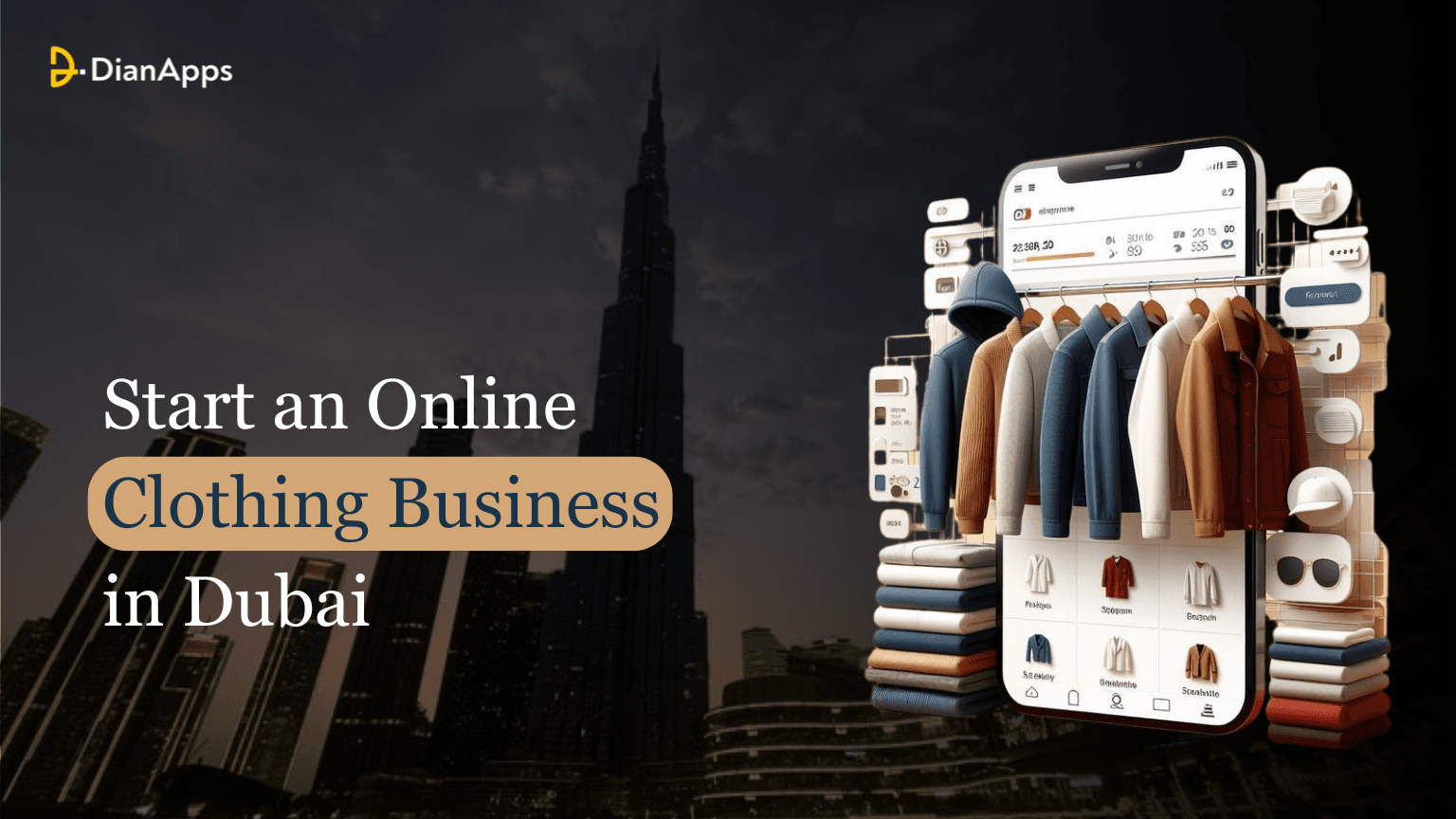
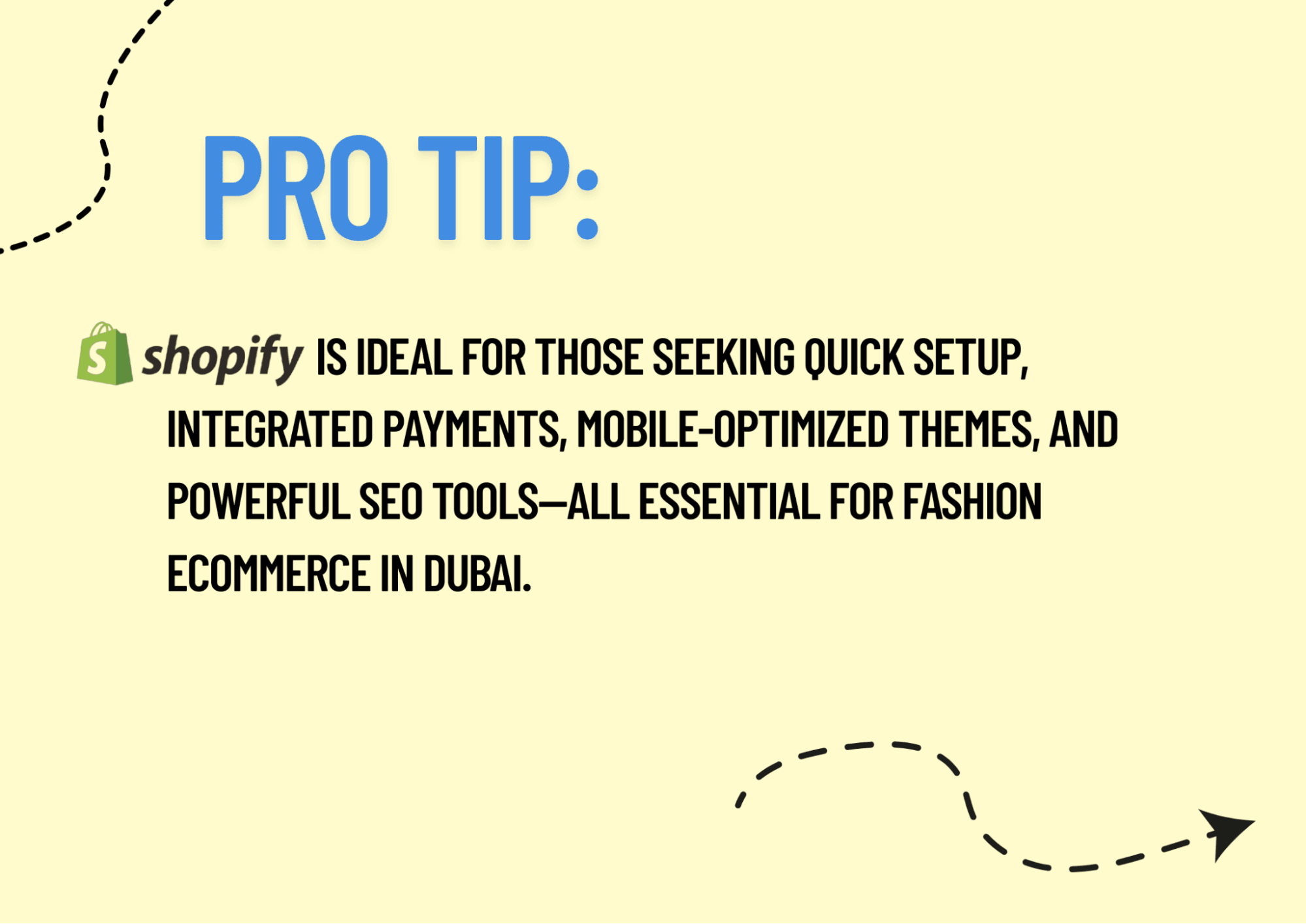







Leave a Comment
Your email address will not be published. Required fields are marked *